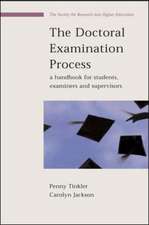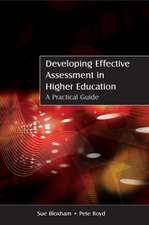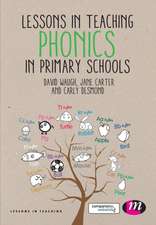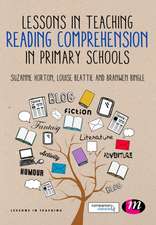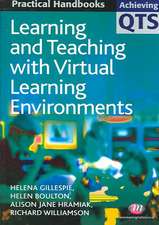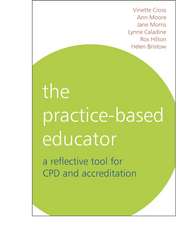Problem-Based Learning in Teacher Education
Editat de Margot Filipenko, Jo-Anne Naslunden Limba Engleză Hardback – 22 dec 2015
The book explains the goals, content, processes and strategies of a successful and longstanding problem-based learning teacher education program at the University of British Columbia. It features contributions from tutors, faculty, school administrators, faculty advisors, school advisors, librarians and pre-service teachers who share their perspectives about problem-based learning as a robust and exciting approach for teaching and learning.
Overall, the contributors to the book discuss the history of the program, its implementation and future directions. In the process, readers discover the ways that problem-based learning has succeeded in preparing educators to teach diverse learners and acquire the professional dispositions necessary for teaching in today’s multilingual/multicultural classrooms.
| Toate formatele și edițiile | Preț | Express |
|---|---|---|
| Paperback (1) | 888.18 lei 43-57 zile | |
| Springer International Publishing – 27 mar 2019 | 888.18 lei 43-57 zile | |
| Hardback (1) | 894.16 lei 43-57 zile | |
| Springer International Publishing – 22 dec 2015 | 894.16 lei 43-57 zile |
Preț: 894.16 lei
Preț vechi: 1090.44 lei
-18% Nou
Puncte Express: 1341
Preț estimativ în valută:
171.10€ • 179.09$ • 142.41£
171.10€ • 179.09$ • 142.41£
Carte tipărită la comandă
Livrare economică 31 martie-14 aprilie
Preluare comenzi: 021 569.72.76
Specificații
ISBN-13: 9783319020020
ISBN-10: 3319020021
Pagini: 220
Ilustrații: XII, 241 p. 4 illus.
Dimensiuni: 155 x 235 x 20 mm
Greutate: 0.54 kg
Ediția:1st ed. 2016
Editura: Springer International Publishing
Colecția Springer
Locul publicării:Cham, Switzerland
ISBN-10: 3319020021
Pagini: 220
Ilustrații: XII, 241 p. 4 illus.
Dimensiuni: 155 x 235 x 20 mm
Greutate: 0.54 kg
Ediția:1st ed. 2016
Editura: Springer International Publishing
Colecția Springer
Locul publicării:Cham, Switzerland
Public țintă
ResearchCuprins
FOREWORD, Anna Kindler and Pawel Kindler.- Discovering, uncovering and creating meanings: Problem-based learning in Teacher Education, Margot Filipenko, Jo-Anne Naslund and Linda Siegel.- SECTION 1: DISPOSITIONS FOR INQUIRY .- Exploring theoretical frameworks of problem-based learning through Aoki’s Curriculum-as plan and Curriculum-as-lived, Jeannie Kerr.- Dispositions for Inquiry, Jo-Anne Naslund and Lori Prodan.- SECTION 2: COLLABORATION: WORKING TOGETHER.- Knowledge Mobilization and Innovation in the Development of a PBL Cohort for Teaching English Language Learners: Successes, Challenges and Possibilities, Margaret Early and Steven Talmy.- Negotiating the content of problems in TELL/PBL, Margot Filipenko.- Finding good governance: Collaboration between the University of British Columbia and the Richmond School District, Kathyrn D’Angelo, Gail Krivel-Zacks and Catherine Johnson.- Collaboration: The heart of the school-based practicum, Carolyn Russo and Nicky Freeman.- SECTION 3: FOSTERING ACTIVE LEARNING.- The Multiple Roles of the Tutor in a Problem-based Learning Cohort in a Teacher Education Program, Frank Baumann and Monica Tarampi.- “I’m not allowed to tell you:” What does it mean to be a Problem-based Learning Tutor? Lori Prodan.- Investigating Cases: Problem-based Learning and the Library, Jo-Anne Naslund.- Integrating Social and Ecological Justice: A Programmatic Strand, Anne Zavalkoff.- The Place of Problems in Problem-based Learning: A Case of Mathematics andTeacher Education, Cynthia Nicol and Fil Krykorka.- Measures of Success: Presentations, Packages and the Triple Jump, Anne Zavalkoff/- SECTION 4: REFLECTIONS.- Challenges Issues as the Teaching English Language Learners through Problem-based Learning (TELL through PBL) moves forward, Margot Filipenko, Jo-Anne Naslund and Lori Prodan.- AFTERWORD, Wendy Carr.- Contributors.- Index.
Textul de pe ultima copertă
This book offers readers a comprehensive understanding of problem-based learning (PBL) in teacher education. Featuring the perspectives of experienced teacher educators, it details the strengths of problem-based learning pedagogy as well as identifies continuing challenges and future possibilities.
The book explains the goals, content, processes and strategies of a successful and longstanding problem-based learning teacher education program at the University of British Columbia. It features contributions from tutors, faculty, school administrators, faculty advisors, school advisors, librarians and pre-service teachers who share their perspectives about problem-based learning as a robust and exciting approach for teaching and learning.
Overall, the contributors to the book discuss the history of the program, its implementation and future directions. In the process, readers discover the ways that problem-based learning has succeeded in preparing educators to teach diverse learners and acquire the professional dispositions necessary for teaching in today’s multilingual/multicultural classrooms.
The book explains the goals, content, processes and strategies of a successful and longstanding problem-based learning teacher education program at the University of British Columbia. It features contributions from tutors, faculty, school administrators, faculty advisors, school advisors, librarians and pre-service teachers who share their perspectives about problem-based learning as a robust and exciting approach for teaching and learning.
Overall, the contributors to the book discuss the history of the program, its implementation and future directions. In the process, readers discover the ways that problem-based learning has succeeded in preparing educators to teach diverse learners and acquire the professional dispositions necessary for teaching in today’s multilingual/multicultural classrooms.
Caracteristici
Underscores the strengths of problem-based learning pedagogy for fulfilling the goals of teacher education Outlines the roles of the stakeholders in a problem based learning teacher education cohort Offers the perspectives of experienced teacher educators applying problem-based learning in practice Identifies the challenges of implementing a problem-based learning approach in teacher education



